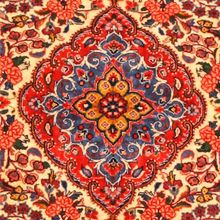Jozan Rug
| Jozan Rug | |
|---|---|
 Design of Jozan Rug (Rugman) | |
| General information | |
| Name | Jozan Rug |
| Original name | قالی جوزان |
| Alternative name(s) | Jozan Rug (Mosul Rug) |
| Origin | |
| Category | City, Village |
| Technical information | |
| Common designs | Medallion, Mihrab, Tree, Vase |
| Common colors | Red, Blue, Navy Blue, Yellow, Pink, Ivory |
| Dyeing method | Natural, Synthetic |
| Pile material | Wool |
| Foundation material | Cotton |
| Knot type | Symmetrical (Turkish), Asymmetrical (Persian) |
Jozan carpet or Jozan rug is a village, city rug that is woven in Arak (Markazi) Province, located in west central of Iran. These rugs are employed symmetrical and asymmetrical knots with cotton foundation and a wool pile. The designs of these rugs are Medallion, Mihrab, Tree and Vase, and the colors are Red, Blue, Navy Blue, Yellow, Pink, Ivory.
History
Jozan is a town in the Arak (Markazi) Province of west central Iran and is located near the famous weaving village of Sarouk. Jozan rugs dating from as early as World War I are known in the market. The rugs are categorized as Sarouks because of the similarity in textures; at times they are called "Jozan Sarouk" in the trade.
Jozan rug designs are semigeometric and frequently have a pendant-shaped medallion in the center and a stylized quarter-medallion in each corner of the background. The field has an allover style of vines with blossoming flowers, flower sprays, and leaves.
The rugs have mainly dark blue fields with reds for the border. In addition to these colors, different shades of blue, green, ivory, gold, cinnamon, and brown are employed for the design elements and minor borders.
Jozan weavers made mainly small rugs, mat-size to approximately seven feet by four feet six inches.No room-sizes were made. The rugs have a cotton foundation and a wool pile. The Turkish (symmetric) knot is used. Jozan rugs are generally woven from good to very good in grade quality.
By the late twentieth century some Jozan weavers changed from their traditional designs to those similar to other cities and villages in the region, in accordance with the demand of consumers both domestic and foreign.[1]
See also
References
- ↑ Moheban, 2015, 270
Bibliography
- Abraham Levi Moheban. 2015. The Encyclopedia of Antique Carpets: Twenty-Five Centuries of Weaving. NewYork: Princeton Architectural Press.